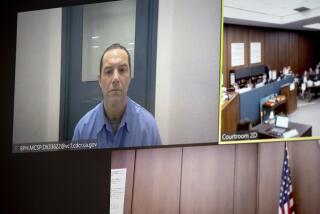Chance to Walk Makes Defendant Hedge His Hopes
- Share via
Freedom is a fabulous--and frightening--concept for Earl H. Rhoney.
After spending the past 3 1/2 years in jail for a murder he says he didn’t commit, Rhoney is for the first time facing the possibility that he will walk away from the Orange County Jail a free man.
“It’s sort of a strange thought,” Rhoney said in a jailhouse interview Saturday. “This whole thing has taken so much time away from my life. It’s hard to think about starting over. How do you do that? I don’t know how I ever could.”
Rhoney, 22, was convicted in 1996 of murdering Patricia Lea Pratt, 46, during a burglary of her home in Irvine’s Turtle Rock community. His conviction was unprecedented in California because it hinged largely on bloodhound-sniffing evidence authorities had gathered through the use of a “scent machine.”
But on the day Rhoney was to be sentenced, Superior Court Judge Anthony J. Rackauckas Jr. threw out the jury’s verdict, calling the bloodhound evidence unreliable. On Friday, more than a year later, another judge agreed, ruling that the scent machine evidence could not be used during Rhoney’s retrial, which is set for June 22.
The decision is a major blow to prosecutors, who relied heavily on the scent machine during the first trial. The machine extracted skin cells from Pratt’s clothing, which had been stored for nine months in an evidence freezer. The material, known as scurf, was transferred to a sterile gauze pad and put before an Irvine Police Department bloodhound. The dog tracked the scent from the pad to Rhoney as he was released from Juvenile Hall for an unrelated burglary in Pratt’s neighborhood.
Based on this evidence, prosecutors argued in court that Rhoney had been in contact with Pratt shortly before her death.
Prosecutors--who have always maintained that Rhoney is the killer--have not said whether they will move forward without that key evidence or drop the case. If they choose the latter, Rhoney would go free.
“I’m trying to be positive,” he said Saturday. “I want to have hope that my luck is finally changing, that I’m finally going to be through with all of this.”
While the latest ruling to exclude the bloodhound evidence has helped restore some of his faith in the justice system, Rhoney said he can hardly stand the thought of enduring another jury trial.
“All I wanted to do last time was stand up in court and scream, ‘I didn’t do it!’ ” Rhoney said. “And I honestly thought that jury was going to come back and say, ‘He’s not guilty, there’s no way this kid did this,’ and then I’d get my life back.”
Instead, Rhoney has remained in jail, waiting for another chance. He said he still talks to his grandparents, with whom he was staying at the time of the 1994 killing, but who have since moved out of state. His father passed away last year, and his girlfriend at the time of his arrest has since married someone else.
“Everything has just gone on,” Rhoney said. “My life just stopped.”
If he is released, Rhoney, who earned a high school diploma in jail, said he wants to get a job and go to college, but not in Orange County.
“I still care about what people think of me, and I can’t live in a place where people think I’m a killer,” he said. “I have a lot of time to make up. I don’t want to live it under a shadow.”
More to Read
Sign up for Essential California
The most important California stories and recommendations in your inbox every morning.
You may occasionally receive promotional content from the Los Angeles Times.













